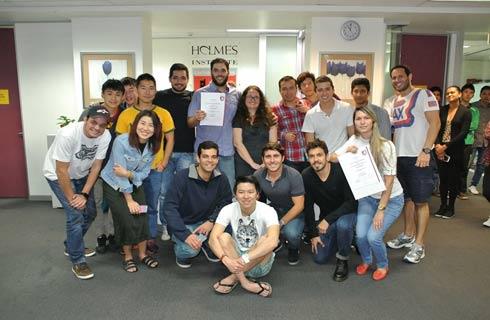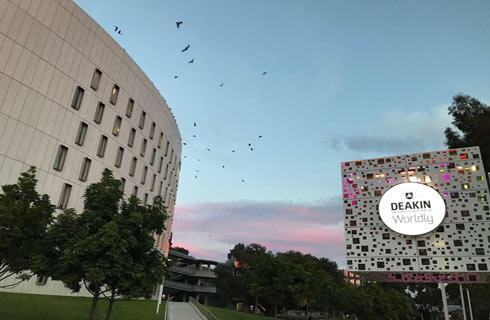工商管理硕士-社会创新管理
Master of Business Administration in Social Innovation Management

学历文凭
Masters Degree

专业院系
Business management and Administration

开学时间

课程时长

课程学费

国际学生入学条件
Students are required to meet the following prerequisites for admission to the program:
A bachelor's degree from an accredited institution.
Undergraduate GPA 2.5 or higher.
Official undergraduate transcripts.
A resume and personal statement.
One letter of recommendation from academic or professional sources.
A writing sample demonstrating capacity to perform at the graduate level.
For international students who have not graduated from an accredited undergraduate institution in the United States, a satisfactory TOEFL score (550 paper-based, 213 computer-based or 80 internet-based) along with an International Transcript Evaluation and a course equivalency report must be provided. International applicants must provide official TOEFL/IELTS/-PTE Academic scores if English is not the applicant's first language. a minimum IELTS score of 6.5
A bachelor's degree from an accredited institution.
Undergraduate GPA 2.5 or higher.
Official undergraduate transcripts.
A resume and personal statement.
One letter of recommendation from academic or professional sources.
A writing sample demonstrating capacity to perform at the graduate level.
For international students who have not graduated from an accredited undergraduate institution in the United States, a satisfactory TOEFL score (550 paper-based, 213 computer-based or 80 internet-based) along with an International Transcript Evaluation and a course equivalency report must be provided. International applicants must provide official TOEFL/IELTS/-PTE Academic scores if English is not the applicant's first language. a minimum IELTS score of 6.5
IDP—雅思考试联合主办方

雅思考试总分
6.5
- 雅思总分:6.5
- 托福网考总分:80
- 托福笔试总分:550
- 其他语言考试:PTE score of 55
CRICOS代码:
申请截止日期: 请与IDP联系 以获取详细信息。
课程简介
在Lynn University获得社会创新管理的MBA知识,并应对21世纪的挑战。该社会创新计划将MBA课程与Amani Institute的社会创新课程结合在一起。它旨在为领导人提供知识,见识和技能,以推动积极的社会变革。因此,如果您对社会影响充满热情并计划在社会企业中创建或工作,那么社会创新管理工商管理硕士是一个不错的起点。您不仅将获得MBA的业务和管理技能,而且还将有机会参加印度或圣保罗保罗阿玛尼学院的社会创新管理计划,巴西。在那里,您将获得有关跨界工作的丰富全球经验。
This social innovation program combines the curriculum of an MBA with Amani Institute's social innovation courses. It is designed to equip leaders with the knowledge, insights and skills to drive positive social change-no matter which sector. If you're passionate about social impact, plan to create or work within a social enterprise, be part of a B Corporation movement or lead an international non-governmental organization, the MBA in social innovation management is a great place to start. Not only will you gain the business and management skills while studying for your MBA, you'll have the opportunity to attend Amani Institute's award-winning social innovation management program in Bengaluru, India or São Paulo, Brazil-economic hubs in the region. There, you will obtain intensive global experience in cross-boundary work while training with master practitioners.
This social innovation program combines the curriculum of an MBA with Amani Institute's social innovation courses. It is designed to equip leaders with the knowledge, insights and skills to drive positive social change-no matter which sector. If you're passionate about social impact, plan to create or work within a social enterprise, be part of a B Corporation movement or lead an international non-governmental organization, the MBA in social innovation management is a great place to start. Not only will you gain the business and management skills while studying for your MBA, you'll have the opportunity to attend Amani Institute's award-winning social innovation management program in Bengaluru, India or São Paulo, Brazil-economic hubs in the region. There, you will obtain intensive global experience in cross-boundary work while training with master practitioners.
相关申请
 预科
预科 奖学金
奖学金 实习机会
实习机会 在校学习
在校学习 跨境学习
跨境学习 校园授课-线上开始
校园授课-线上开始 在线/远程学习
在线/远程学习
本校相关课程

Bachelor of Science in Aviation Management
学历文凭
Bachelor Degree
开学日期
课程费用总额


Professional Performance Certificate in Instrumental Collaborative Piano
学历文凭
Graduate Certificate
开学日期
课程费用总额


Graduate Certificate in Hospitality Management
学历文凭
Graduate Certificate
开学日期
课程费用总额


Graduate Certificate in Digital Media
学历文凭
Graduate Certificate
开学日期
课程费用总额


Master of Music in Instrumental Collaborative Piano
学历文凭
Masters Degree
开学日期
课程费用总额


Master of Music in Composition
学历文凭
Masters Degree
开学日期
课程费用总额










 美国
美国
